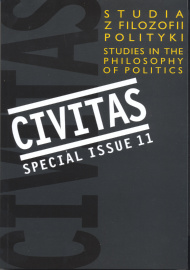The State in the Continental European Tradition
The State in the Continental European Tradition
Author(s): Paweł KaczorowskiSubject(s): Philosophy
Published by: Instytut Studiów Politycznych PAN
Keywords: State; Carl Schmitt; authority; post-traditional society; legitimization.
Summary/Abstract: The main issue is: what is the State? An article presents what the concept of State entails, the essential elements of its structure, and the basic stages of its development. The State is a historical creation. It has a specifi c existential cause and purpose, and a set organizational framework within which its entire ethical and political substance must be inscribed. The framework and the substance of the State are distinct spheres, and the awareness of the distinction between these two spheres is important. At the same time, they can only be distinguished in the abstract. In reality one cannot separate them or glimpse them functioning separately, as if on different levels. In reality both dimensions interpenetrate and are mixed together. The organizational dimension only exists as a condition for the axiological, albeit a necessary condition. The other, axiological dimension is also necessary, but in a different way. The first is necessary because of the realities of life, the real situation. The second is necessary in the moral sense. Necessity in the moral sense is immutable, whereas the necessity of an organizational framework depends on the historical-social situation and can therefore change. Thus, if the conditions, circumstances or the factual situation should change, then the organizational framework could actually turn out to be useless, whereas the values and ideals remained necessary.
Journal: Civitas. Studia z filozofii polityki
- Issue Year: 2009
- Issue No: 11
- Page Range: 77-97
- Page Count: 21
- Language: English

